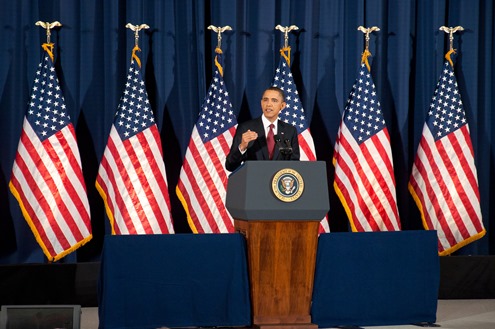While President Obama’s September 10 speech outlining a strategy to combat ISIL has been viewed as a return to intervention , he is expanding the US role only very reluctantly . Mounting pressure from both elite and public opinion prompted Obama to act, but it would be a mistake , Paul Saunders notes, to conclude from this that the president Obama ha s fundamentally changed his attitudes and approaches.
* * *
Observers inside and outside the United States increasingly describe President Barack Obama’s September 10 statement outlining his strategy to combat the so-called Islamic State in Iraq and the Levant (ISIL) as Obama’s return to intervention. Those who advance this perspective argue that public opinion has also shifted significantly and, as a result, that Americans have rejected “isolationism.” They are wrong in both respects.
Obama is clearly expanding the US role in fighting ISIL only very reluctantly. The president’s initial response to ISIL’s expansion was to describe what the United States would not do—put ground troops into Iraq—and to demand new leadership in Baghdad that could credibly appeal to not only Shiites but also Sunnis and Kurds to resist ISIL’s advances. At the time, the administration’s military action was limited strictly to air strikes to keep ISIL away from US personnel and from refugees.
Obama did not appear inclined to do more than that. Indeed, a slight expansion of US strikes, together with Iranian and other support for Baghdad, quickly stabilized the situation on the ground and even allowed Iraqi forces to recapture some territory. Especially important was their success in taking back a dam and hydroelectric power station at Haditha. Under the circumstances, the president could well have announced that his approach was working, albeit slowly.
Why then did the president decide to give a major speech announcing increased American involvement in Iraq’s war on ISIL?
Mounting Interventionist Opinion
The answer lies in a peculiar combination of elite opinion and public opinion. Broadly speaking, America’s elites are considerably more interventionist than its people, something confirmed repeatedly in public opinion polls. Elites—including politicians, pundits, editorial writers at major newspapers, and television commentators, among others—have severely criticized Obama’s unwillingness to use force or to take tough stands for some time. Syria’s continuing civil war, Russia’s annexation of Crimea, and ISIL’s successes in Iraq were especially effective ammunition for those disturbed by Obama’s weakness.
At the same time, the American public has been increasingly troubled that Obama and the United States look weak but still was unwilling to get too involved in foreign problems—until ISIL’s brutal beheading of two American journalists. Extensive television coverage of the killings, combined with the suggestion that ISIL could send terrorists to US soil, produced a desire for revenge tinged with concern that inaction could lead to attacks in America itself. That is why a recent poll [1] found 71% for air strikes in Iraq. Another poll [2] found that Americans see ISIL as almost as dangerous to the United States as al Qaeda.

This combination of elite and public opinion was irresistible to a president whom only 43% of the public see as a strong leader. Obama needed to act and—as usual when he is under pressure—decided to give a speech.
Nevertheless, it would be a mistake to conclude from this that either Obama or the American public has fundamentally changed their attitudes and approaches. Obama is reacting to political pressure that may or may not continue. Taking into account that the fight against ISIL will be a long one (US officials have said three years), it is entirely possible that as public opinion moves elsewhere, which it inevitably will if ISIL doesn’t act to stay on the front pages, the president will face less pressure and will put less effort into combating ISIL. (Ironically, this might make the fight an even longer one.) Conversely, if Obama’s policy leads to real costs, the public may turn against it.
Public Support for Air Strikes
America’s interventionists ignore two key pieces of evidence when they argue that Americans are turning away from “isolationism.” First, as demonstrated in a recent survey by the Chicago Council on Global Affairs [3] , Americans are not actually isolationist—they support vigorous US international leadership but are wary of military action. Second, they are much more likely to support the use of force when they see a direct threat to the United States, another conclusion of the Chicago Council’s study. This is most immediately apparent in public support for air strikes against ISIL in Syria, now at 65% according to a Washington Post poll [4] .
Public support for attacking ISIL inside Syria is especially important to understanding what is happening inside the United States—especially because the public has been and remains reluctant to use force to oust Syrian President Bashar al-Assad. The difference? Americans see ISIL as a threat but not Assad. This is where elite and public opinion diverge—and it is why the United States has not done more in Syria so far. Even after forcing Obama to press for action to enforce his own red line on Syria’s use of chemical weapons, interventionist elites were not able to persuade the public that America had to become involved.
Now, popular support for air strikes against ISIL in Syria may actually strengthen Assad’s position by damaging his toughest foes. It is highly unlikely that the United States will be able to vet and train so-called moderate Syrian opposition fighters (even to increase pressure on Assad, much less defeat him) more quickly than it can destroy the radicals. The public thus wants something in Syria that is almost directly at odds with elite preferences—and helping the moderate opposition is unlikely to bridge the difference.
Taking all of this into account, it is far too simplistic to describe the United States as “isolationist” or “not isolationist”—or to reduce American “leadership” to the use of force.
[1] http://www.washingtonpost.com/politics/poll-public-supports-strikes-in-iraq-syria-obamas-ratings-hover-near-his-all-time-lows/2014/09/08/69c164d8-3789-11e4-8601-97ba88884ffd_story.html
[2] http://www.washingtonpost.com/blogs/the-fix/wp/2014/09/09/what-explains-the-publics-support-for-air-strikes-against-isis-the-terrorism-nerve/
[3] http://www.thechicagocouncil.org/UserFiles/File/Task%20Force%20Reports/2014_CCS_Report.pdf
[4] http://www.washingtonpost.com/politics/poll-public-supports-strikes-in-iraq-syria-obamas-ratings-hover-near-his-all-time-lows/2014/09/08/69c164d8-3789-11e4-8601-97ba88884ffd_story.html
